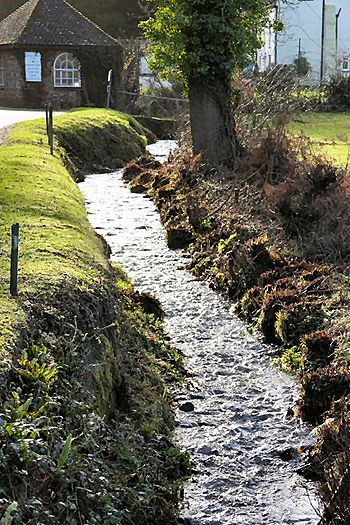River Holford facts for kids
Quick facts for kids River Holford |
|
|---|---|

The River Holford in Holford Combe
|
|
| Country | England |
| County | Somerset |
| City | Holford |
| Physical characteristics | |
| Main source | Lady's Fountain Spring, Frog Combe Halsway, Quantock Hills, Somerset, England 820 ft (250 m) 51°8′20″N 3°12′56″W / 51.13889°N 3.21556°W |
| River mouth | Kilve, Somerset, England 0 ft (0 m) 51°11′34″N 3°13′37″W / 51.19278°N 3.22694°W |
| Length | 4.5 mi (7.2 km) |
The River Holford is a small river in Somerset, England. It flows through the eastern part of the Quantock Hills. This area is known as an Area of Outstanding Natural Beauty.
The river is about 4.5 miles (7 km) long. It starts at a place called Lady's Fountain Spring in Frog Combe. This is near Halsway and about 820 feet (250 m) above sea level. From there, it flows past the village of Holford. The river then ends when it reaches the sea at Kilve.
Contents
Studying the River Holford
The River Holford is a great place for students to learn. They can study how rivers shape the land. This field of study is called fluvial geomorphology. It helps us understand how water changes the Earth's surface.
River Holford's Rocks
The river flows over three different types of rock. These rocks affect how the river behaves.
Rocks at the Top
At the start of the river, you find Quartzite. This is a very hard rock. It is a Metamorphic rock, meaning it changed from another rock due to heat and pressure. Quartzite is very strong and does not easily wear away. It can form ridges in the landscape.
Rocks in the Middle
In the middle part of the river, there is a rock called Marl. Marl is a Sedimentary rock. This means it formed from layers of mud and clay.
Rocks at the Bottom
Closer to the sea, the river flows over Limestone. Limestone is also a Sedimentary rock.
How Rocks Affect the River
The Quartzite and Marl rocks are mostly impermeable. This means water cannot easily soak through them. So, the river water stays on top of these rocks.
However, the Limestone at the bottom is permeable. Water can pass through it. As the river flows over the Limestone, some water soaks into the ground. This makes the river shallower in these areas.

